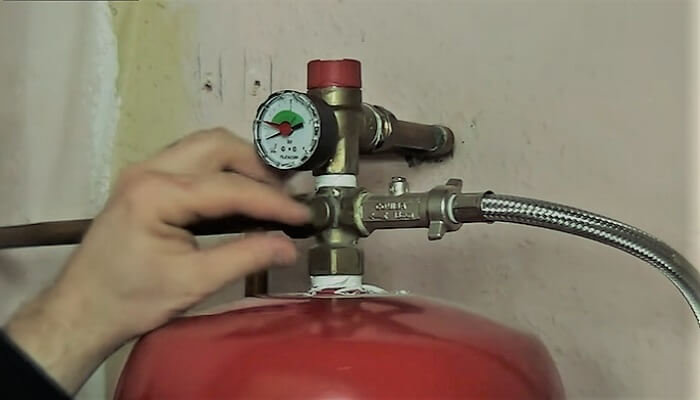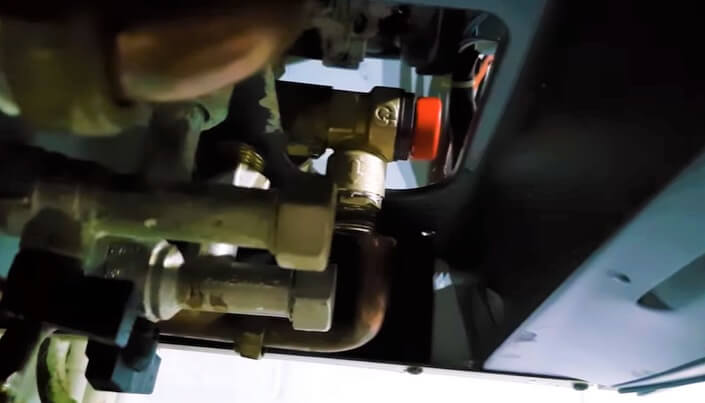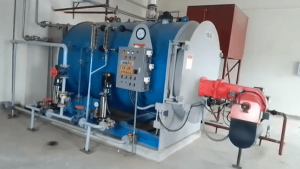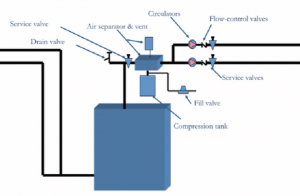Disclosure: As an Amazon Associate, I earn from qualifying purchases. Learn more
Last Updated on August 20, 2022 by Rhyes Frank
A Combi boiler system is a great way to heat your home and have hot water on demand. If you have a combi boiler in your home, you know how important it is to have one that is working properly. If you have combi boiler problems, you need to find ways to fix them so that your boiler can provide you with the heat and hot water you need. But, like any other heating system, it needs to be properly maintained to prevent problems.
There are a few different ways you can go about solving combi boiler problems, and it’s important to know what each of these options entails before deciding on the best course of action for your home.
1. How to Drain a Combi Boiler System?
Draining your combi boiler system is an important part of maintenance, and it’s not as difficult as you might think. With a little bit of preparation and the right tools, you can easily drain your combi boiler system in just a few steps.
1. Turn off the power to your combi boiler. This is an important safety step, so be sure to do it first.
2. Close the water supply valve to your combi boiler. This will prevent any water from entering the system while you’re working on it.
3. Open the drain valve on your combi boiler. This will allow the water in the system to start draining out.
4. Place a bucket or other container under the drain valve to catch the water as it drains out.
5. When the water has finished draining, close the drain valve.
6. Open the water supply valve to your combi boiler. This will allow fresh water to enter the system.
7. Turn on the power to your combi boiler. This will allow the system to start heating the new water.
Draining your combi boiler system is an important part of keeping it in good working order. By following these simple steps, you can easily do it yourself.

2. Why Does the Combi Boiler Drop the Pressure and How to Increase Pressure?
If your combi boiler’s pressure drops too low, it can affect the amount of hot water you have access to. Low pressure also puts extra strain on the boiler, which can lead to premature wear and tear. In some cases, a combi boiler pressure drop can also be indicative of a leak.
There are a few different reasons why your combi boiler’s pressure may drop. One possibility is that the pressure relief valve is leaking. The pressure relief valve is a safety feature that allows excess pressure to escape from the boiler. If the valve is damaged or not functioning properly, it can cause the boiler’s pressure to drop.
Another possibility is that there is a leak in the boiler itself. A leak can occur in any part of the boiler but is most likely to occur in the heat exchanger. The heat exchanger is the part of the boiler where heat is transferred from the burning fuel to the water. If there is a crack in the heat exchanger, water can leak out and cause the boiler’s pressure to drop.
If your boiler’s pressure drops, you may notice that the amount of hot water you have access to decreases. This is because the boiler is not able to build up enough pressure to force hot water through the taps. In some cases, you may also notice that your boiler makes strange noises or that the pilot light keeps going out.
If you suspect that your boiler’s pressure has dropped, you should check the pressure gauge on the boiler itself. If the pressure is below 1 bar, it is considered too low and you will need to increase the pressure. To do this, you will need to bleed the radiators.
Bleeding the radiators is a simple process that anyone can do. First, you will need to locate the bleed valve on each radiator. The bleed valve is usually located at the top of the radiator. Once you have found the bleed valve, turn it counterclockwise until water starts to drip out.
As the water drips out, you will notice that the pressure gauge on the boiler starts to rise. Once the pressure has reached 1 bar, you can turn off the bleed valve and the radiator will be bled.
If your boiler’s pressure drops frequently, it is a good idea to have it checked by a qualified engineer. They will be able to identify the cause of the problem and recommend a course of action.
3. How to Replace Pressure Relief Valve on Combi Boiler?
If your boiler is leaking or not operating correctly, it may be time to replace the pressure relief valve. Although this is not a difficult task, it is important to follow the proper steps to ensure a safe and successful repair.
Turn off the power to the boiler and allow it to cool. Close the main water supply valve to the boiler. Drain the boiler by opening the drain valve at the bottom of the unit.
Remove the old pressure relief valve by unscrewing it from the boiler. Be sure to save the old gasket for the new valve. Install the new valve in the same location, using the old gasket.
Tighten the new valve until it is snug, careful not to over-tighten and damage the unit. Open the main water supply valve and fill the boiler. Turn on the power to the boiler and check for leaks.

4. How to Get the Air Out of Combi Boiler?
If your Combi boiler is not working efficiently, it could be because there is air in the system. Getting the air out of your Combi boiler is a relatively simple process that you can do yourself.
If your Combi boiler is not firing up, it could be because there is air in the system. When there is air in the system, it prevents the boiler from getting the correct amount of gas, which in turn prevents it from igniting.
If your boiler is not igniting, the first thing you should do is check the gas supply. If the gas is turned off, then you will need to turn it back on and wait for the boiler to reset itself. Once the boiler has reset itself, try igniting it again.
If the boiler still will not ignite, then it is likely that there is air in the system. In order to get the air out of the system, you will need to bleed the radiators. To bleed the radiators, you will need to locate the bleed valve. The bleed valve is usually located at the highest point of the radiator.
Once you have found the bleed valve, turn it anti-clockwise until you hear a hissing sound. This sound indicates that the air is escaping from the system. Once the air has stopped escaping, turn the bleed valve clockwise to close it.
Repeat this process for each radiator in your home until you have bled all of the radiators. Once all of the radiators have been bled, the air should be out of the system and your boiler should be working efficiently again.
5. Combi Boiler Making Noise When Running Hot Water?
If your combi boiler is making noise when running hot water, it could be due to a few different issues. The first thing you should check is the water pressure. If it’s too low, the boiler will make a loud banging noise. You can adjust the pressure yourself or call a plumber to do it for you.
Another reason your boiler might be making noise is that the water in the tank is too hot. This can cause the pressure to build up and make the boiler make a hissing noise. To fix this, you’ll need to adjust the thermostat so that the water doesn’t get too hot.
If your boiler is still making noise after you’ve checked the water pressure and temperature, it might be due to a build-up of limescale. This can happen if you have hard water. To get rid of the limescale, you can descale the boiler yourself or call a plumber to do it for you.
If you can’t figure out why your boiler is making noise, it’s best to call a plumber. They’ll be able to diagnose the problem and fix it for you.

